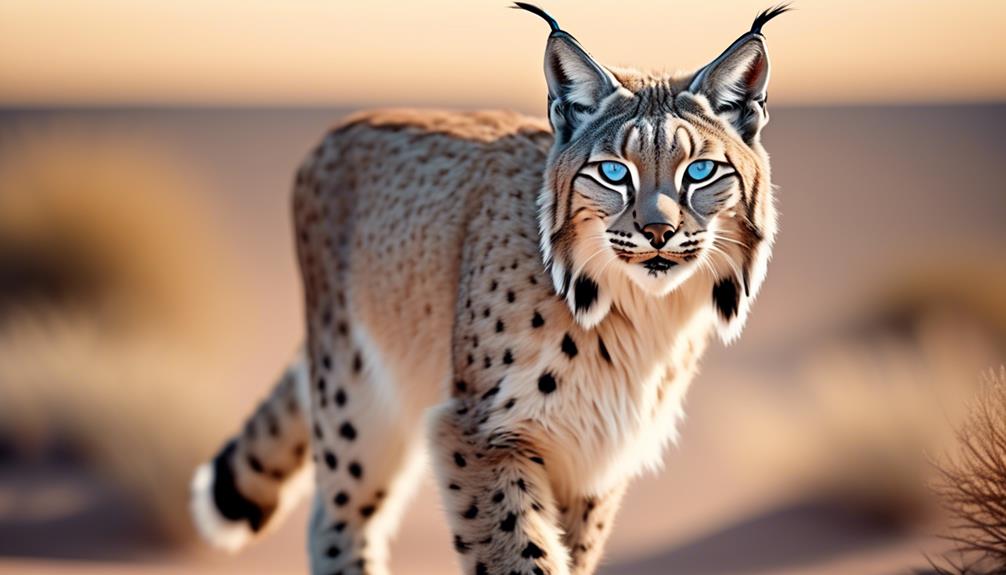
The Desert Lynx cat breed offers a fascinating blend of wild and domestic traits, making them an intriguing choice for cat enthusiasts.
With their unique appearance and playful personality, these medium to large-sized cats have garnered attention from both breeders and pet lovers alike.
But what makes the Desert Lynx so special?
This discussion will explore their general information, history, size, personality, health, care, coat color, grooming needs, and how they interact with children and other pets.
From their origins to their adaptability, there is much to discover about this remarkable feline breed.
So, let’s embark on a journey into the world of the Desert Lynx and unravel the captivating characteristics that set them apart.
Key Takeaways
- The Desert Lynx is a mixed-breed cat that originated in the United States, possibly with the influence of the bobcat and is recognized by the IPCBA.
- They are medium-sized cats weighing 8 and 16 pounds and known for their intelligent, playful, and affectionate nature.
- The Desert Lynx has moderate to high exercise needs and requires weekly brushing for grooming. They are generally a healthy breed with no specific health problems, but regular veterinary checkups are important.
- The coat of the Desert Lynx can have various patterns and colors, such as spotted, ticked, or clouded, in shades like chocolate brown, silver, ebony, and blue. They are a good breed for households with children and can get along with other domestic animals, though caution should be exercised with smaller pets. Rescue groups and shelters are good places to find Desert Lynx cats for adoption.
General Information and Characteristics
The Desert Lynx cat breed is a medium to large-sized mixed breed originating from the United States.
They are known for their intelligent, playful, and affectionate nature.
These cats have a varied coat that can be short, dense, and spotted or marbled, depending on the mix of breeds.
They have a lifespan of 12-15 years and are recognized by The International Progressive Cat Breeders Alliance (IPCBA).
The Desert Lynx is a generally healthy breed with moderate to high exercise needs.
They are easy to train and require weekly brushing for grooming.
Regarding size, females are usually smaller than males, and weight ranges from 8 to 16 pounds.
See another cat breed profile.
Devon Rex Cat Breed
Desert Lynx History and Recognition
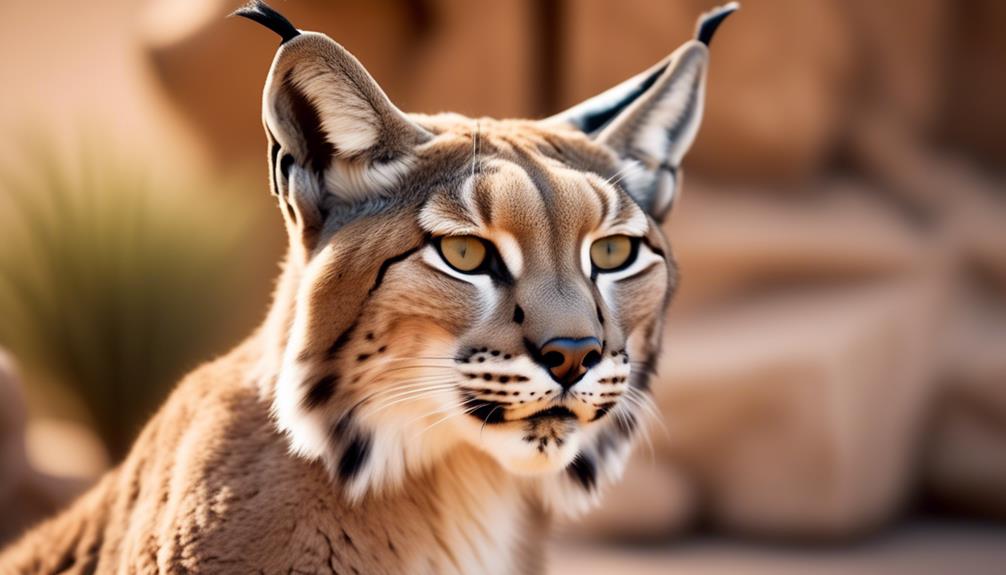
Originating possibly from the bobcat, the Desert Lynx cat breed was created as a mixed breed to combine the wildcat look of the bobcat with domestic sensibilities.
The breed’s origin can be traced back to the bobcat, resulting in its wild appearance.
The Desert Lynx is recognized by The International Progressive Cat Breeders Alliance (IPCBA), which acknowledges its unique qualities.
This recognition adds to the breed’s appeal and validates its distinct characteristics.
Additionally, this breed can be found in shelters or rescue groups, making adoption a great option for those interested in bringing a Desert Lynx into their home.
Adopting a Desert Lynx provides a loving home for a deserving cat and allows individuals to experience the joys of owning this fascinating breed.
With its fascinating heritage and recognition from reputable organizations, the Desert Lynx proves to be an intriguing and desirable breed for cat lovers.
Its wild appearance and domestic sensibilities make it an exceptional choice for those seeking a unique and captivating feline companion.
Desert Lynx Size and Personality
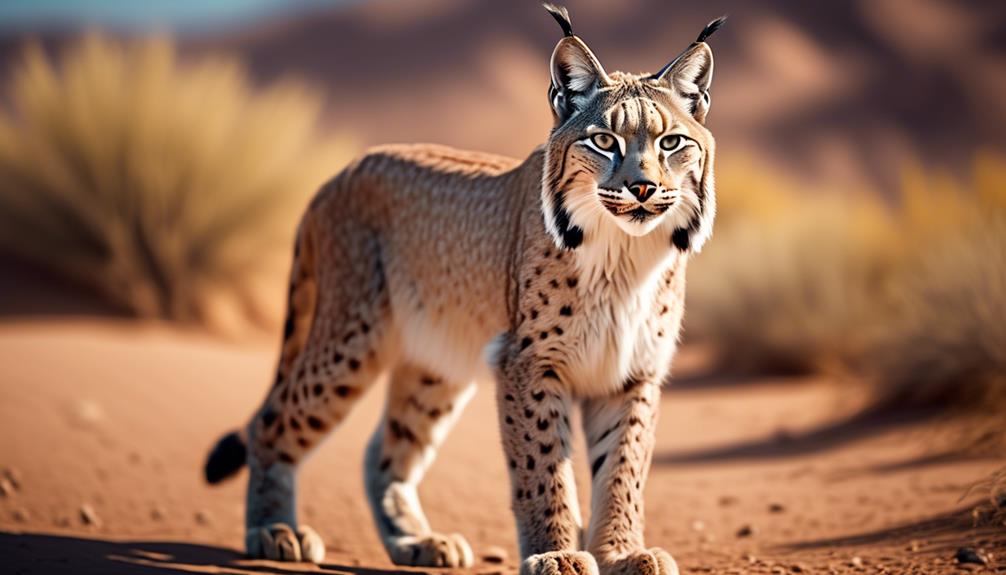
Desert Lynx cats are medium-sized felines known for their intelligent, playful, and affectionate personalities.
They typically weigh between 8 and 16 pounds, with males being larger than females.
However, size standards may vary.
These cats are easy to train and require moderate to high exercise needs.
Weekly brushing is recommended to maintain their short, dense, and often spotted or marbled coat.
Regarding health, the Desert Lynx is generally a healthy breed with no specific health problems.
Regular veterinary checkups are important to ensure their well-being.
With their friendly and sociable nature, Desert Lynx cats can get along well with children and other domestic animals, but supervision is advised, particularly when interacting with smaller pets.
Desert Lynx Health and Care
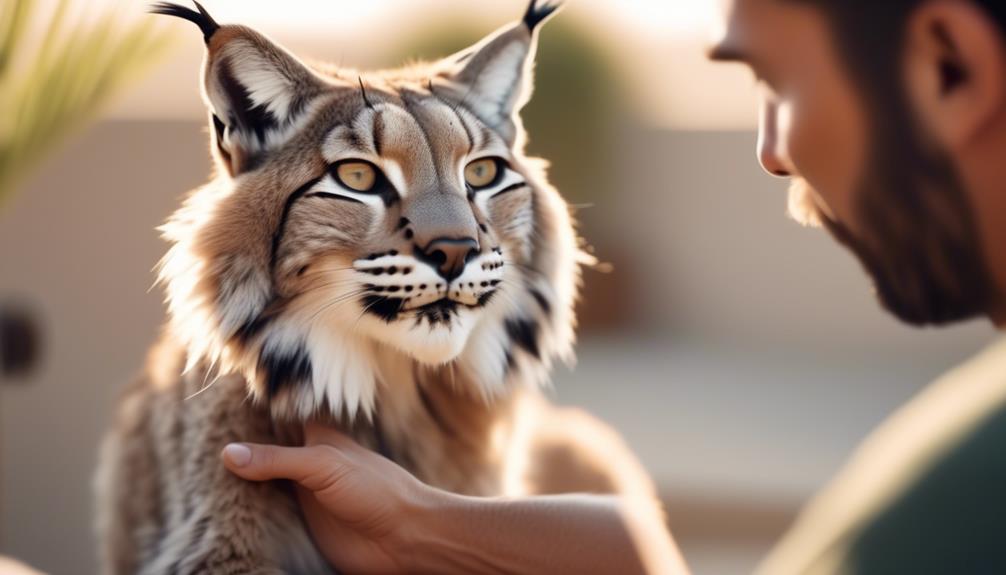
Regarding the health and care of Desert Lynx cats, regular veterinary checkups and a well-developed care routine are essential.
These cats are generally considered a healthy breed with no breed-specific health problems.
However, it is important to watch for signs of distress or pain and schedule wellness visits with the vet.
Developing a care routine with the vet is crucial to ensure the cat’s well-being.
Providing a scratching post for healthy scratching and regularly examining the ears for dirt or infection are important aspects of their care.
Additionally, starting a teeth brushing regimen with the vet’s advice can help maintain their oral health.
Desert Lynx Coat Color, Grooming, and Interaction With Children and Other Pets
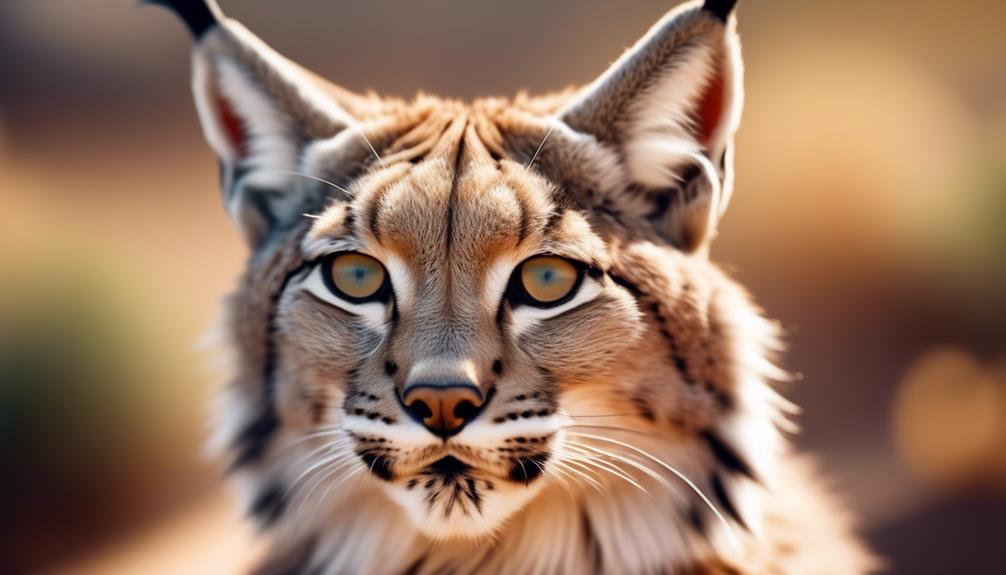
The coat color, grooming needs, and compatibility with children and other pets are important aspects to consider when discussing the Desert Lynx cat breed.
Desert Lynx cats have a variety of coat patterns, including spotted, ticked, or clouded, and can come in colors such as chocolate brown, silver, ebony, and blue.
To maintain their coat, they should be brushed once or twice a week to prevent mat formation.
In hot climates, providing shade and fresh water is important to keep the cat comfortable.
When interacting with children, Desert Lynx cats are generally good with kids, but early socialization and setting boundaries are crucial.
They can also get along with other domestic animals, but caution should be exercised with smaller pets, and playtime should be supervised.
Frequently Asked Questions
Are Desert Lynx Cats Prone to Any Specific Allergies?
Desert Lynx cats are not known to be prone to any specific allergies.
However, it is important to note that individual cats may still develop allergies to certain substances, so it is always a good idea to monitor their health and consult a veterinarian if any concerns arise.
What Is the Average Lifespan of a Desert Lynx Cat?
The average lifespan of a Desert Lynx cat is 12-15 years. This breed is generally healthy with no specific health problems.
Regular veterinary checkups, proper care routine, and monitoring for signs of distress are important for their well-being.
Do Desert Lynx Cats Require Any Special Dietary Needs?
Desert Lynx cats do not have any special dietary needs. They can thrive on a balanced and nutritious cat food diet.
It is important to always provide fresh water and consult with a veterinarian for specific dietary recommendations.
Are Desert Lynx Cats Prone to Excessive Shedding?
Desert Lynx cats are not prone to excessive shedding. However, regular grooming is still recommended to prevent mat formation in their short, dense coats.
Weekly brushing should suffice to keep their fur healthy and minimize shedding.
How Do Desert Lynx Cats Adapt to Apartment Living?
Desert Lynx cats can adapt well to apartment living with enough physical and mental stimulation.
They are intelligent, playful, and affectionate, making them suitable for smaller spaces.
Regular exercise, interactive toys, and vertical spaces are recommended for their well-being.
Conclusion
In conclusion, the Desert Lynx is a unique and playful cat breed that combines the wildcat appearance of the bobcat with domestic sensibilities.
With a medium-sized and affectionate nature, they make great family companions and can adapt well to households with children and other pets.
This breed is generally healthy with no specific health problems, but regular veterinary checkups and a tailored care routine are important.
Consider adoption from shelters and rescue groups to provide a loving home to a Desert Lynx.




